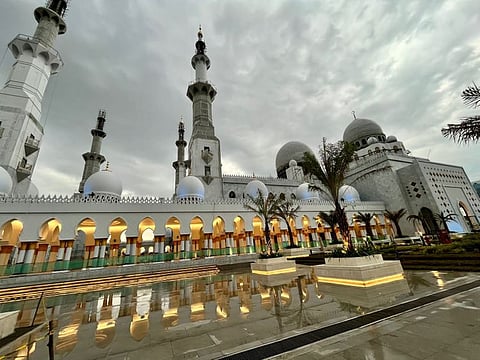Replica of Abu Dhabi's Sheikh Zayed Grand Mosque to open in Indonesia next month
Upcoming place of prayer in town of Solo will accommodate 10,000 worshippers at a time

Abu Dhabi: The Indonesian town of Solo is set to get its own replica of Abu Dhabi’s iconic Sheikh Zayed Grand Mosque next month.
Once opened, the mosque will be able to accommodate 10,000 worshippers at a time, Husin Bagis, Indonesian Ambassador to the UAE, told Gulf News.
“The mosque is located in the hometown of Indonesia’s president, Joko Widodo, and is another visible symbol of the friendship between our two nations,” Bagis said.
Promoting tolerance
The ambassador was speaking ahead of the G20 Leaders Summit, which is set to be held in Bali next month, and to which the UAE has been invited as a guest.
The Indonesian replica is smaller than the Abu Dhabi mosque, which can accommodate 40,000 worshippers, but like its counterpart, it too is being built to embody Islam’s message of peace and tolerance. The mosque also features a similar white façade, as well as architecture that draws attention to the beautifully rounded domes and shapely corridor arches.
Both the UAE and Indonesia have a shared vision of promoting tolerance and combatting extremism, as demonstrated by their leaders, UAE President His Highness Sheikh Mohamed Bin Zayed Al Nahyan and Indonesian President Joko Widodo, Bagis said.
“[This invitation to the G20 Leaders Summit] is a political gesture where we want to show that the UAE is an important partner in achieving goals both bilaterally and globally, especially as the UAE is leading in the summit’s three priority issues: global health architecture, digital transformation and sustainable energy transitions,” the ambassador explained. Strengthening relations
Bilateral relations between Indonesia and the UAE have only strengthened in recent years.
The UAE named a street in the capital’s Embassies Area as the President Joko Widodo Street, and is also constructing a mosque in the area to be named after the Indonesian leader.
For his part, President Widodo has visited the UAE twice this year, including to share his condolences after the death of deceased UAE President, the late Sheikh Khalifa Bin Zayed Al Nahyan.
“Many believe the closeness between the two nations is because they are two big countries, Indonesia because of its population size and the UAE because of its sovereign wealth. But the bonds are actually propelled by the strong personal relationship between the two leaders. Widodo has visited the UAE every year since 2020,” Bagis said.
New embassy
Meanwhile, the Indonesian community in the UAE will benefit from brand new embassy premises in the capital’s Embassies area from November onwards.
“We will soon be moving to this new embassy office, which will have an ambassador’s residence and a consular service building as one integral portion. To celebrate it, we will be hosting a Diplomatic Reception on November 29 this year. This new building sends a strong message of the increasing level of closeness of bilateral relations between the two countries,” Bagis said.
Indonesian expat community
There are currently 100,000 Indonesia expats living and working in the UAE. About 20 per cent of them are employed as professionals and 80 per cent are in domestic work. Bagis said the nation is now working to increase the proportion of Indonesian professionals coming to the UAE, especially in the fields of hospitality and healthcare.
There is also an ongoing initiative place more Indonesian imams to lead prayers at mosques across the UAE.
“The expected target is 200 imams by the end of 2022. Currently, the number of priests who have served here is 41,…with 29 more imams arriving in mid-October. This is a good example of the closeness of bilateral relations of the two countries in terms of socio-cultural relations. These imams will be the ambassador of Indonesia, and they will share the moderate Islam of Indonesia. When their contract expires and they return to the UAE, they will also take back with them the UAE’s message of tolerance and coexistence,” Bagis said.
Increasing trade
The two nations are expected to implement a comprehensive economic partnership agreement (CEPA) from January 2023 onwards.
“The UAE’s exports to Indonesia are currently valued at about $2 billion (Dh7.35 billion) a year, and mainly comprise of petrochemicals, rubber products, plastics and steel. In turn, Indonesia export about $2 billion (Dh7.35 billion) worth of gold, automobile spare parts, tyres, crude palm oil, batteries, rubber, paper, food products, and clothing, to the UAE each year. When the CEPA comes into effect, there will be a number of benefits, including the elimination of the five per cent tariff on gold exports to the UAE, so this volume is expected to increase from $170 million (Dh624 million) to $1 billion (Dh3.67 billion) a year. We also expect an increase in exports of rubber products and tyres,” Bagis said.
“The UAE-Indonesia CEPA was signed in July 2022 here in Abu Dhabi, we are expecting that it will be ratified by both government when [Sheikh Mohamed Bin Zayed] visits Indonesia for the G20 Leaders Summit,” he added.
Sign up for the Daily Briefing
Get the latest news and updates straight to your inbox



